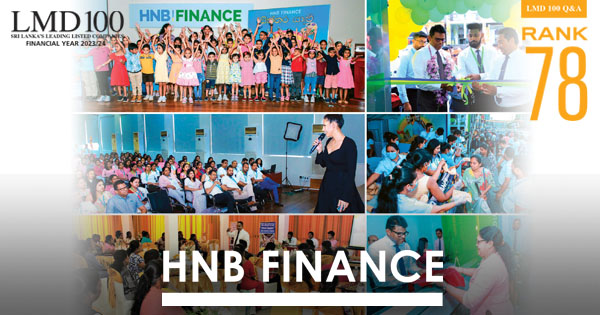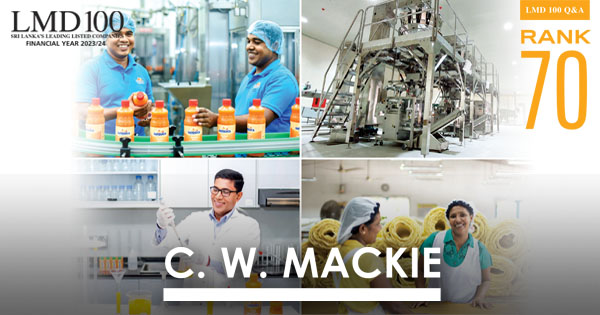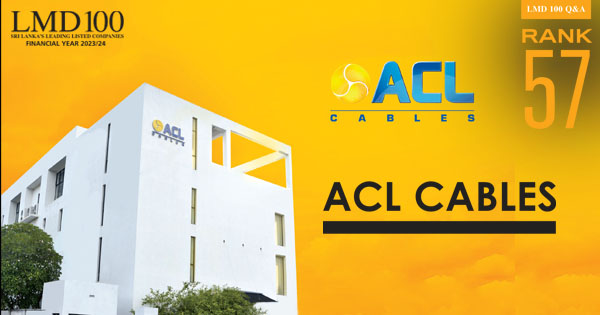LMD 100 SECOND BOARD Q&A
WATAWALA PLANTATIONS

Q: How is Watawala Plantations faring under existing macroeconomic conditions?
A: The macroeconomic environment has been turbulent in recent times. Despite multiple challenges, we have been able to maintain the crop and production due to sustainable business practices, which contribute to better top and bottom lines along with better prices.
The country is facing several issues due to the lack of foreign reserves. Against this backdrop, we’re proud to be an import substitution business and do our part for the nation.
Sri Lanka is a net importer of edible oil, importing about 240,000 tonnes annually. Local edible oil production amounts to around 44,000 tonnes of which palm oil accounts for approximately 24,000 tonnes with Watawala producing about half of this.
We also added cinnamon, cardamom, coconut, avocado and potato cultivation to our portfolio, to avoid being limited to traditional crops like tea and rubber.
In 2016, we diversified the business by establishing Watawala Dairy – a dairy farm with around 1,800 cows. The cattle effluent has enabled us to fertilise our plantations with cow dung, and compost and liquid fertiliser. Our fertiliser production capacity is 8,000 tonnes a year.
While predominantly operating a B2B business model, we moved closer to customers by commencing home deliveries of premium fresh milk through an innovative farm to home concept.
 Q: And how do you view the state of business in Sri Lanka?
Q: And how do you view the state of business in Sri Lanka?
A: The country is in a precarious position. There are challenges in many areas ranging from food security and agricultural sustenance, to import restrictions and supply chain bottlenecks.
We see crises as opportunities since they compel us to re-look at strategies, operations, efficiency and going concerns.
To this end, we intend to maximise local production and meet local demand. Our main strategy is to source crops from our fields and keep costs low while being sustainable. This has been a winning formula and enabled us to support customers.
Q: What are the company’s medium-term priorities in the prevailing business environment?
A: The company prioritises sustainable operations, and is committed to achieving the best results in terms of sustainability and environmental conservation. Watawala is said to have been the first company in South Asia to obtain the coveted RSPO (Roundtable on Sustainable Palm Oil) certification – an assurance that our palm oil production is sustainable.
With a focus on environmental protection, we continue to carry out soil-based sustainable activities such as soil mapping, rehabilitation, conservation and site specific fertiliser application. Furthermore, we monitor rainfall and metrics related to carbon emissions, and strive to reduce energy and water consumption as a responsible corporate citizen.
Irrespective of the business environment we operate in, our plan is to continue prioritising sustainability and environmental conservation, taking them to greater heights while growing the business, developing employees and supporting society.
We obtained ISO 45001 certification for occupational health and safety management systems, and are in the process of acquiring ISO 14001 and ISO 50001 certifications for environmental management systems and energy management systems respectively.

Q: How do employees add value to the business?
A: Watawala’s businesses are labour intensive and our employees are our greatest asset. Their commitment is internally driven – it’s because of them that we have been able to continue operations during the pandemic without disruptions.
We have around 1,500 employees and conduct many engagement activities with them. And we always strive to gather bottom-up feedback to keep this important workforce content.
As a responsible corporate citizen, Watawala strives to improve employees’ livelihoods and introduce development to the region. We work closely with estate communities, and constantly seek to make a meaningful and lasting difference in their lives.
Watawala constructed a modern, fully equipped preschool with advanced learning facilities and a play area in keeping with international standards. We also built a dispensary and medical centre for the Udugama community. In addition, the company contributes to infrastructure development and amenities such as roads, bridges, clean and potable water, and medical assistance.
Q: How is the agriculture sector likely to perform in the post-COVID era?
A: We expect it to enjoy greater prominence and importance. The agriculture sector was disrupted by local and global lockdowns. However, it was resilient and was able to continue production – albeit with lower productivity – and was a key contributor to the recovery of many countries.
I believe that Sri Lanka can achieve agricultural self-sufficiency and be globally competitive with an array of export crops.
Q: How are innovation and technological changes impacting the sector?
A: We continuously invest in technology to improve efficiency, propelling the company to greater heights with advanced agricultural best practices.
Moreover, innovative thinking among employees is encouraged. Presently, we have a scheme to recognise those who bring in new ideas and innovative changes to the existing system.
The company currently uses drones for geographic information system (GIS) mapping, earth augers, rotaries, machines for pruning and land preparation, and automation in the palm oil mill.
We joined hands with the University of Peradeniya and donated a sap flow meter worth Rs. 1.4 million to monitor perennial crops’ plant water use. This is the only sap flow sensor in the local university system.
Q: Could you outline the company’s future plans?
A: We want to expand our agribusiness, which has immense potential in Sri Lanka.
Furthermore, we plan to diversify into perennial and short rotation crops, to have a larger and more rewarding portfolio. We’re also looking at value additions based on our crops and building a state-of-the-art cinnamon innovation centre as a start.
At Watawala Dairy – which is a subsidiary of Watawala Plantations – we plan to grow the milking cow herd and will be importing more cattle from Australia in the coming months. The company is exploring innovative plans to source the required cattle feed and grow maize to achieve self-sufficiency.
Additionally, we plan to increase the presence of our premium pasteurised fresh milk and ghee while exploring other value added products.
We are also keen to introduce innovations to the country in terms of fertilisers, and two projects are underway at Watawala Dairy and Nakiyadeniya Palm Oil Mill in Udugama. Through both, we’re looking to create value additions and develop alternative fertiliser options, on top of our existing multipurpose organic fertiliser that is enriched with microbes and higher nitrogen content.
The company will also be looking to divest into agroforestry to integrate trees into crop and animal farming systems to enhance the sustainability of its operations while yielding better results.






